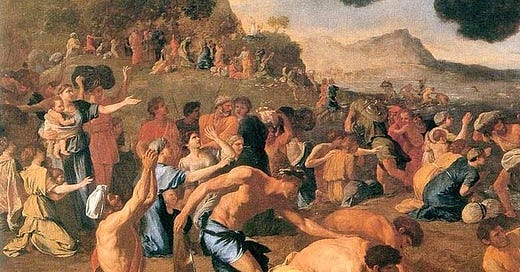THE CROSSING OF THE RED SEA: A DEFEAT OF CHAOS AND THE EGYPTIAN GODS
Water has played a central role in the development of human civilizations since the dawn of time, and Ancient Egypt was no exception. This essential resource shaped the lives of the Egyptians, influencing their religious beliefs, economic systems, and cultural practices. One particularly fascinating aspect of water in Ancient Egypt is its connection to chaos, as exemplified by the biblical story of the crossing of the Red Sea.
In this article, we will explore the symbolic significance of the crossing of the Red Sea in relation to the defeat of chaos and the Egyptian gods, and how this event can be understood within the broader context of Ancient Egyptian religious beliefs.
Chaos and the Primordial Waters of Nun
The association of water with chaos in Ancient Egyptian cosmogony is primarily evident in the concept of the primordial waters of Nun. Nun was the personification of the chaotic, unformed waters that existed before the creation of the world. The sun god Atum emerged from the waters of Nun and initiated the process of cosmic order by creating the first divine couple, Shu (air) and Tefnut (moisture).
This association between Nun and chaos is further reinforced by the Egyptians' belief that the underworld, known as Duat, was filled with the same watery chaos. The deceased had to navigate these treacherous waters on their journey to the afterlife, confronting numerous challenges and threats that mirrored the chaotic nature of the primordial waters.
The Crossing of the Red Sea: A Symbolic Defeat of Chaos
The biblical story of the crossing of the Red Sea can be interpreted as a symbolic defeat of chaos and the Egyptian gods within the context of Ancient Egyptian religious beliefs. According to the Book of Exodus, the Israelites, led by Moses, escaped slavery in Egypt by crossing the Red Sea, which miraculously parted to allow them safe passage. As they crossed, the Egyptian army pursued them, only to be engulfed by the returning waters, thus drowning Pharaoh's forces.
In this narrative, the parting of the Red Sea represents a temporary victory over the chaotic forces of water, as the Israelites are granted safe passage through the dangerous waters. The subsequent engulfing of the Egyptian army signifies a defeat of chaos, as the forces of order, represented by the Israelites, overcome their oppressors, who are associated with the chaotic elements of Egyptian religion.
The Defeat of the Egyptian Gods
The crossing of the Red Sea can also be interpreted as a symbolic defeat of the Egyptian gods, who were closely associated with the natural forces that the Israelites overcame. This event demonstrated the superiority of the God of Israel over the Egyptian pantheon, as the biblical narrative portrays the miraculous parting of the Red Sea as an act of divine intervention.
The drowning of the Egyptian army represents not only the defeat of chaos but also the humiliation of the Egyptian gods, who were unable to protect their subjects. This event challenged the authority of the Egyptian gods and served as a powerful reminder of the limitations of human control over the natural world and the forces of chaos.
Conclusion
The crossing of the Red Sea, as narrated in the Book of Exodus, can be understood as a symbolic defeat of chaos and the Egyptian gods within the context of Ancient Egyptian religious beliefs. This event demonstrated the triumph of order over chaos, as well as the superiority of the God of Israel over the Egyptian pantheon. The story of the crossing of the Red Sea has left a lasting impact on the religious and cultural heritage of the region, highlighting the crucial role that water played in shaping the worldviews of the ancient peoples.
Discussion Questions:
What are the significant ways in which the crossing of the Red Sea story reflects on the understanding of water in ancient Egyptian cosmogony?
How did the defeat of chaos and the Egyptian gods, as symbolized by the crossing of the Red Sea, influence the development of Jewish religious thought?
Considering the limitations of human control over the natural world, how do you interpret the symbolism of the miraculous parting of the Red Sea?
Want to Know More?
"Religion and Magic in Ancient Egypt" by Rosalie David: This book provides a comprehensive overview of ancient Egyptian religion, including the concept of chaos and the primordial waters of Nun. It can help readers gain a deeper understanding of the religious beliefs that influenced the interpretation of the crossing of the Red Sea.
"The Oxford Guide: Essential Guide to Egyptian Mythology," Edited by Donald B. Redford
This guide offers an extensive look into Egyptian mythology, including the belief system around the Egyptian gods that were symbolically defeated in the Red Sea crossing. It provides rich insights into the cosmology and religious beliefs of ancient Egypt."The Bible Unearthed: Archaeology's New Vision of Ancient Israel and the Origin of Its Sacred Texts" by Israel Finkelstein and Neil Asher Silberman
This work discusses the archaeological evidence and historical context of biblical narratives, including the Exodus story. It's an essential resource for understanding the crossing of the Red Sea within its historical and cultural contexts.




